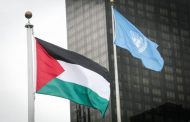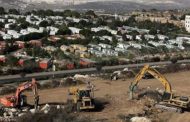Bold action is required by the stakeholders in order to help the Palestinian Authority (PA) sustain a devastating socio-economic impact of the coronavirus pandemic, COVID-19, urged Nickolay Mladenov, United Nations Special Coordinator for the Middle East Peace Process.
“I am concerned about the socio-economic consequences of the COVID-19 health crisis on the Palestinian people, particularly vulnerable communities in Gaza,” he said in a statement.
“In addition to the public health implications of the pandemic, the negative shock to the Israeli and Palestinian economies will have profound implications for public welfare, employment, social cohesion, financial and institutional stability.
“If current trends continue, the damage to the Palestinian economy will be substantial,” he said.
“Economic contraction and necessary public health restrictions are having an adverse effect on the economy and the viability of the Palestinian Authority (PA). Revenues from trade, tourism and transfers have declined to their lowest levels in the last two decades. It is estimated that the fiscal gap for 2020 will reach $1 billion by the end of the year.”
Mladenov said that with very ed control over its economy, the Palestinian Government does not have access to the conventional monetary and fiscal tools necessary to remedy the crisis, which are in the hands of Israel.
“Preserving the functioning and stability of the PA is vital to the security and well-being of both Palestinians and Israelis alike,” he added.
“The current situation is extremely dangerous and calls for bold action by all stakeholders.”
The UN official stressed that Israel has a critical responsibility in helping the PA deal with this crisis.
“I welcome the emergency transfer of some 120 million Israeli shekels ($33.6 million) last month to the PA. This is an important first step. Urgent discussions however need to take place on how Israel can ensure regular transfers, even if clearance revenues continue to fall, in order to guarantee a smooth functioning of Palestinian institutions and service delivery to the Palestinian people. Both parties must work quickly to resolve barriers standing in the way of regular transfers, including withheld clearance revenues.”
Palestinian Finance Minister Shukri Bishara yesterday called on Israel to transfer the full amount of the monthly clearance tax revenues it collects on behalf of the PA to help it deal with more than 70 percent decline in revenues due to COVID-19 pandemic.
In addition to an intervention by Israel, Mladenov said, the Palestinian government will also require generous external support and technical assistance that is targeted directly to the recovery process. This demands improved coordination among donors with a focus on prioritized, targeted and integrated programing that guarantees transparency and accountability of funding, he said.
Mladenov said the Ad Hoc Liaison Committee (AHLC) forum provides the platform for support to the PA as it moves forward on the recovery process, welcoming the statement of the Chair of the AHLC on 3 April 2020, calling for strong international donor support.
“The UN has been working closely with all stakeholders to ensure coordinated assistance to the health networks dealing with the spread of the virus in the occupied West Bank, including East Jerusalem, and Gaza,” he said.
“We stand ready to support the Palestinian Government’s socioeconomic response plan and urge all stakeholders to do the same.”






